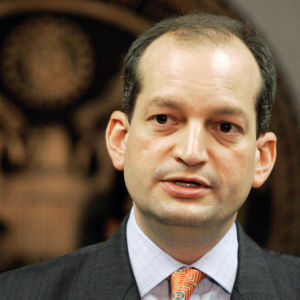Labor Secretary Alexander Acosta argued Wednesday that it is critically important to change the perception that college is the only pathway to a productive lifelong career.
Americans in recent decades have become increasingly reliant on a college degree as a prerequisite for work. But the result has been a younger workforce with a narrower skill set, many good jobs unfilled, and many would-be workers struggling to find fulfilling careers.
Acosta said during the hearing that the solution is to encourage people instead to pursue job training that matches their interests and talents. Dispelling the notion that only all jobs require a college degree and expanding alternative training opportunities will help.
President Donald Trump has taken a particular interest in apprenticeship programs to train workers. He signed an executive order encouraging the Department of Labor to find ways to expand those programs. And on Monday, Acosta hosted the first task force meeting dedicated to fulfilling that goal.
“This is an issue that is so important. We should be growing apprenticeships in this nation,” Acosta said Wednesday. “Members of the task force include leaders from business, from labor, from educational associations, from trade associations, two governors, community organization leaders, public individuals—all coming together to talk about how to expand apprenticeships across industries, especially into those industries where apprenticeships are underrepresented.”
The House Education and the Workforce Committee hosted the hearing to discuss the Department of Labor’s policies to improve the workforce. The hearing also marks the department’s National Apprenticeship Week, a time to recognize the importance of apprenticeship programs and explore ways to expand and improve them.
Acosta noted during the hearing that while a college education is the right pathway for many Americans, it isn’t always. Apprenticeships are often associated with trade industries, but Acosta hopes they can expand across diverse fields.
“One important takeaway from that meeting was that the apprenticeship programs as currently envisioned are not scaling. They are not growing at the rate that they could grow,” Acosta said. “Currently, it’s 0.3 percent of the American workforce, and the vision is to scale and grow these further, and we’re engaged in discussions on how to do that.”
Acosta added that part of the solution is to streamline the process by which the government certifies apprenticeship programs. Democratic Rep. Susan Davis expressed concern during the hearing that the proposed streamlining may lead to ineffective programs.
The Secretary responded to the concerns by noting it is important to develop a system which balances the need to ensure programs are thorough, while also simplifying certification.
“As we go forward, it is critical we maintain high-quality apprenticeships,” Acosta said. “As we talk with leaders across the nation, there is great interest, but the registered apprenticeship program is viewed as cumbersome. The registration process with the Department of Labor takes a long time.”
Acosta has made apprenticeships a top priority since becoming labor secretary April 27—with the administration hoping those programs could help close the skills gap and fill the many jobs left open in the absence of adequately trained workers.
The economy is showing signs of improvement, Acosta also noted during the hearing. But key shortcomings remain. And apprenticeship programs and more diverse job training might just do the trick.

